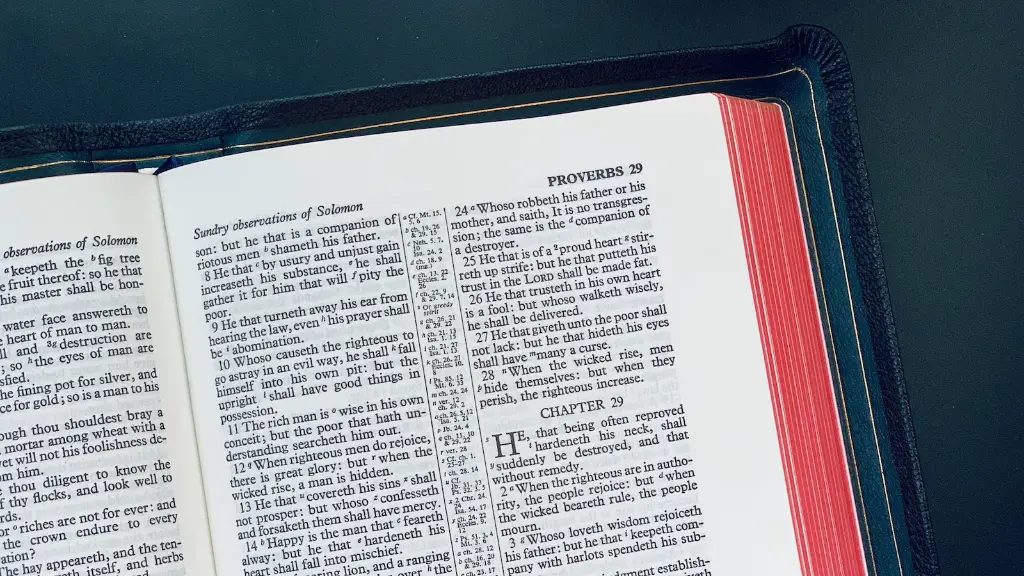What Does ‘Behold’ Mean in the Bible?
Behold is an English word that appears more than 300 times in the King James Version of the Bible and is primarily used to draw the reader’s attention to a particular sentence, phrase, or idea. Though its precise meaning may vary with each context and translation of the Bible, a spiritual interpretation of the word encompasses a sense of awe and reverence.
The Greek word which is used in the New Testament to describe the idea of “behold” is “idou”. This word may be translated as an imperative, idou meaning “See!” or as an interjection, meaning “Look!” Sometimes the Hebrew counterpart to this word is also used, which is “hineh”. In either case, the idea of ‘behold’ is used to prompt readers to pause and consider whatever message, vision, or revelation follows.
The phrase ‘Behold!’ is typically used in scripture to emphasize a point and to alert readers to pay special attention. For example, in Matthew 26:26, Jesus breaks bread and says “Behold the bread which my Father hath given me”. Here, the immediacy of “behold” as Jesus presents the bread is used to draw attention to the signficance of it as a symbol of his body being broken for us. Similarly, in Matthew 6:34, Jesus says, “Behold the birds of the air…Consider the lilies of the fields”. Here, the ‘behold’ implies a shift in attention away from the worries of everyday life to appreciate the gifts and miracles God has arranged for us in the world.
Some Bible translations replace “behold” with different verbs, such as “see”, “look”, or “consider”. The exact word used is a matter of interpretation. However, the intent of the translation remains the same: to draw attention to what is happening in the Bible and to suggest a deep inner meaning that goes beyond the literal.
Reflecting on what the Bible is telling us is an important part of Christian faith. Therefore, it is important for Bible readers to pay attention when ever they come across the word ‘behold’. There may be something deep and powerful in the message behind these words and the invitation to pause and consider is one that should never be taken lightly.
Significance of the Word
The New American Standard Bible states in Isaiah 48:17, “Thus says the Lord, your Redeemer, the Holy One of Israel,”Behold, I have put My words in your mouth”. In this verse, ‘Behold’ implies an emphasis on the importance of the words God is about to deliver. The call to behold captures the reverence and awe that God has for His own words and it further emphasizes the significance of those words for those who pay attention and heed what is being said.
In Genesis 22:13-14, when God speaks to Abraham before he sacrifices Isaac, He says, “Do not stretch out your hand against the lad, and do nothing to him; for now I know that you fear God, since you have not withheld your son, your only son, from Me.” Behold is used in this passage to highlight the gravity of the scene and to add reverence to the experience.
Biblical commentators often use the word ‘behold’ to emphasize their interpretation of the text. David K. Lowery suggests that “Behold” is an invitation to the reader to take pause, allowing the reader a moment to consider the in-depth significance of what is being said. He further adds that this word adds an air of sacredness, reminding the reader that the words being presented are not merely mundane but that they have come from God himself.
Behold in Everyday Usage
Though ‘behold’ is mainly used in religious contexts, it is also sometimes used in everyday use- as an adjective to indicate seen or do wonders. This usage of the word can be found in expressions such as “Behold the beauty of nature” and “Behold the power of language”.
In modern culture, words like ‘Behold’ are becoming more and more scarce. In an increasingly digital and fast-paced world, we often lack the attention span or the reverence required to pause and consider concepts in the same way that Biblical writers did.
Consequently, many modern Bible translations are shifting away from ‘Behold’ in favour of a simpler version. Take, for example, Romans 6:13 which reads, “Do not offer any part of yourself to sin as an instrument of wickedness, but rather offer yourselves to God as those who have been brought from death to life”. In this translation, the emphasis on “Behold” has been replaced with “offer”. Though subtle, this shift in language subtly changes the message and gives us a different perspective.
With the world changing and evolving, the use of ‘Behold’ in its true forms runs the risk of being diluted and forgotten. It is incumbent upon us to remember and to remember to pause, revere, and consider the words of the Bible.
Examples from Popular Media
The phrase ‘Behold’ has been popping up in famous works of literature and on television shows. In his novel The Catcher in the Rye, J.D. Salinger has the protagonist, Holden Caulfield, say, “Behold the founder of the Caulfield clan, the builder of its fortune, the father of a daughter who’d marry a snob! ” Here, the use of the word ‘Behold’ conveys a sense of astonishment and power.
The popular show Suits also had a character use the phrase ‘Behold’ in a conversation. In the episode, one character says to another: “Behold! The mighty return of the white knight”. Again, the use of ‘Behold’ here conveys the same sense of amazement and power that the word evokes in scripture.
Furthermore, the phrase ‘Behold’ is often used ironically and sarcastically in everyday speech. We often hear people give a half-hearted “Behold” accompanied with a wave of the hand, when what they really mean to say is “Here we go again” or “Another one of these”.
Though ‘Behold’ appears in common idioms and modern phrases, its original origins and its full meaning are often lost in day-to-day conversation. Its use in popular culture is typically ironic and humorous, and this contrasts strongly with its original heavy and awe-inspiring meaning.
Conclusion
The word ‘Behold’ appears in the Bible over 300 times, calling readers to pay attention to the vision, the message, or the revelation that follows. Though respectful reverence for the word itself and for the Bible may be waning in popular culture, its original meaning can still be felt in works of literature, in religious circles and in everyday language. Understanding the intended message behind the word ‘Behold’ is an important part of interpreting the Bible: It reminds us to pay attention and to consider each passage on a deeper level.




